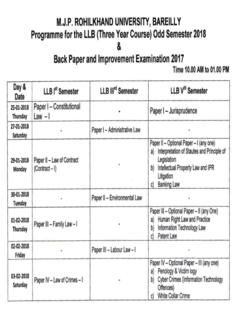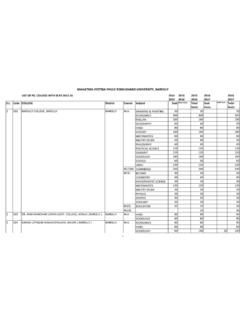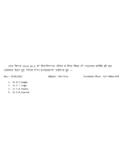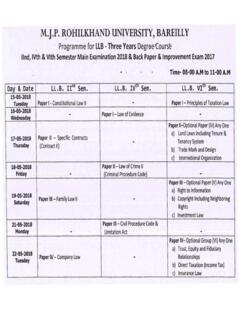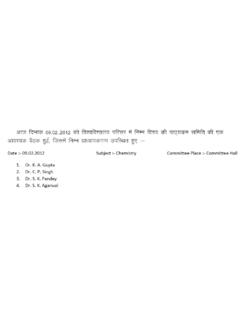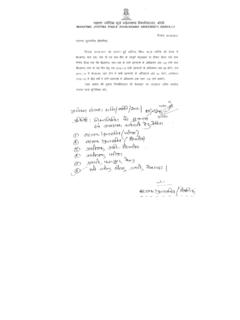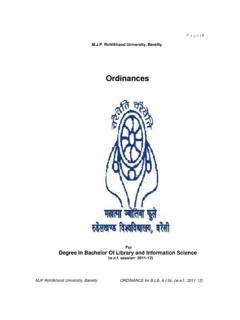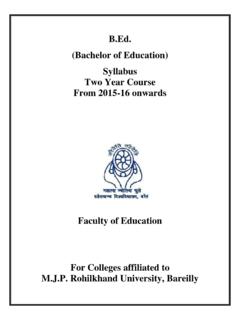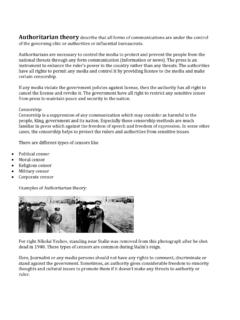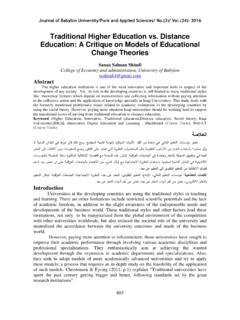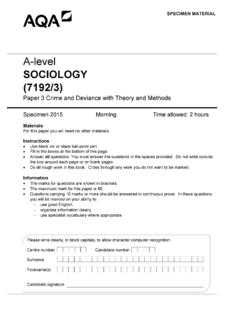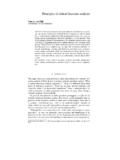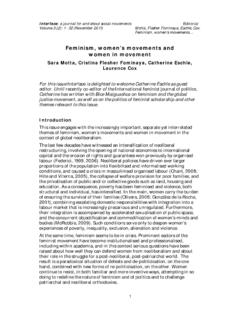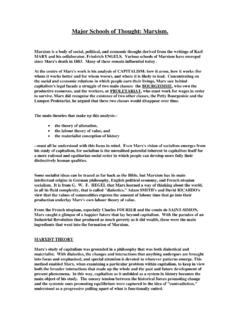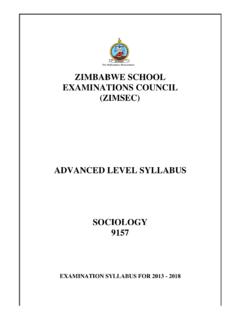Transcription of STATE LEVEL SYLLABUS OF - Mahatama Jyotiba Phule ...
1 1 STATE LEVEL SYLLABUS OF SOCIOLOGY FOR UNDERGRADUATE LEVEL Prepared by: DR N. C. Shukla Convener (Sociology, University, Kanpur) Professor A. K. Sharma Member ( , Kanpur) Dr. Anoop Kumar Singh Member ( ( ) College Kanpur) Professor Member (Dr. University, Sagar) I Sociology Paper Ist: Introduction to Sociology. Objectives: This introductory paper is intended to acquaint the students with sociology as a social science and the distinctiveness of its approach among the social science. It is to be organized in such a way that even students without any previous exposure to sociology could acquire an interest in the subject and follow it. Course Outline: Unit 1: The nature of Sociology. The meaning of Sociology: Origin, Definition, Scope, Subject matter, Nature and relation of sociology with other social Sciences.
2 Humanistic orientation to Sociological study. Unit 2: Basic concepts Society, community, Institution, Association, Group, Social structure, status and role, Human and Animal Society. Unit 3: Institutions. Family and kinship, religion, education, STATE . Unit 4: The individual and Society. Culture, Socialization, Relation between individual and society. Unit 5: The use of Sociology. Introduction to applied sociology-Sociology and social problems, Ecology and Environment: Pollution, Global warming and Green house effect. Impact of Industrialization and Urbanization on Environment. Essential readings: Bottommore. 1972, Sociology: A guide to problems and literature. 2 Bombay :George Allen and Unwin (India) : Harlambos, Sociology: Themes and perspectives.
3 New Delhi Oxford University Press. : Inkeles, Alex, 1987. What is Skociology? New Delhi: Prentice-Hall of India. : Jaiaram, No. 1988 . What is Sociology .Madras:Macmillan, India : Johnson, Harry M. 1995. Sociology: A Systematic Introduction. New Delhi , Allied Publishers. : Schaefer, Richard T. and Robert P. Lamm. 1999 Sociology. New Delhi Tata-Mac Graw Hill. Pedagogy: : While introducing sociology as a social sciece emphasisshould be laid on the distinctiveness of its perspective rather than on its substantive theme of study. : For effective teaching and meaningful learning, illustrations may be drawn from relevant empirical studies. : Throughout the course, conscious effort should be made to drive home the relevance and significance of sociology for understanding society and in attempting to solve its problems.
4 Paper II nd. Society in India: Structure and Change. Objectives : It is presumed that student has some familiarity with Indian sociery by virtue Of the fact that he is a member of it and that he has observed and Experienced some facts of it. However this familiarity is likely to be Superficial selective and rather fragmentary. The course is aimed at recti- -fying these limitations by presenting a comprehensive, integrated and empirically based profile of Indian society. The continuity between the present and the past is an evident feature Of Indian society. Though this continuity is reflected ink the structure of the course. The focus is on the contemporary Indian society. It is hoped that the sociological perspective on Indian society presented in this course will also enable students to gain a better understanding of their own situation and region.
5 Course outline: Unit 1- The structure and composition of Indian Society: Villages, Towns, Cities, rural Urban linkages, tribes, weaker section, dalits and s, women and minorities population profile and related issues. Unit 2- Cultural and ethnic diversity, diversities in respect of language, caste, regional and religious beliefs and practices and cultural pattern . 3 Unit 3- Basic Institutions of Indian society: Caste, marriage, religion, class, joint family and democracy. Unit 4- Culture: Material and Non material culture, cultural lag. Changes and transformation in Indian society ,factors affecting National integration: Regionalism Communalism and Naxalism.. Essential readings: :: Bose, 1967, Culture and Society in India.
6 Bombay : Asia Publishing House. :: Bose, 1975, Structure of Hindu Society. New Delhi. :: Dube, 1990, Society in India.(New Delhi: National Book Trust.) :: Dube, 1995, Indian Village (London : Routledge) :: Dube, 1958: India s changing Villages (London: Routledge and Kegan Paul). :: Karve, Irawati, 1961 : Hindu Society : An Interpretation(Poona : Deccan- College) :: Lannoy, Richard, 1971: The Speaking Tree : A study of Indian Society and Culture (Delhi: Oxford University Press). :: Mandelbaum, 1970 : Society in India (Bombay: Popular Prakashan) :: Srinivas, 1980 : India: Social Structure ( New Delhi: Hindustan -Publishing Corporation) :: Srinivas, 1963: Social Change in Modern India (California, Berkeley: University of California Press).
7 :: Singh, Yogendra,1973 : Modernization of Indian Tradition ( Delhi: Thomson Press). :: Uberoi, Patricia, 1993: Family, Kinship and Marriage in India (New Delhi: Oxford University Press ). Pedagogy: :: The use of audio-visual media should be necessary and important componant of instruction. :: The participation and involvement of students should be ensured through formal and informal discussions in the class room and field visits. They should be encouraged to write short essays on the local situation and local issues under the guidance of the teacher. :: Wherever possible, illustrations should be drawn from the local situation.
8 Sociology Paper Ist. : Indian Society: Issues and Problems Objectives: Society in India today is undergoing rapid and massive changes. Many of the Changes are such that they tend to call into question the age-old social 4 norms and practices, thus giving rise to some critical social issues and problems. This course is designed to indentify and analyze come of such emerging Social issues and problems form sociological perspective. In the interest of systematic ordering, the issues and problems have been classified into four sets: structural, familial development and organizational. The course seeks to go beyond the commonsense understanding of the prevailing social issues and problems in order to project them into their structural context.
9 Accordingly, it focuses on their structural linkages and interrelationships. Hence the objectives of the course are to sensitize the students to the emerging social issues and problems of contemporary India, enable them to acquire sociological understanding of these issues and problems over and above their commonsense understanding, empower them to deal with these issues and problems and to serve as change agents both in governmental and non-governmental and organizations. Course outlines Unit 1: STRUCTURAL: Poverty, inequality of caste and gender, Problemes of Religious, ethnic and regional, minorities,backward classes and dalits. Human Rights violation Unit 2: FAMILIAL: Dowry, domestic violence, divorce, intra and inter- Generational conflict, problemes of elderly.
10 Unit 3: DEVELOPMENTAL: Development induced displacement, ecological degradation, consumerism, crisis of Values. Unit 4: DISORGANIZATIONAL: Crime and Delinquency, White Collar crime and criminals, drug addiction, suicide, terrorism, cyber crime. Corruption in public sphere. Essential readings: :: Beteille,Andre, 1974, Social Inequality, New Delhi, OUP :: Beteille, Andre, 1992, Backward classes in Contemporary India,New Delhi OUP. :: Berreman, 1979, Caste and other inequalities: Essays in inequality, : Meerut:Folkore Institute. :: Dube, Leela.
